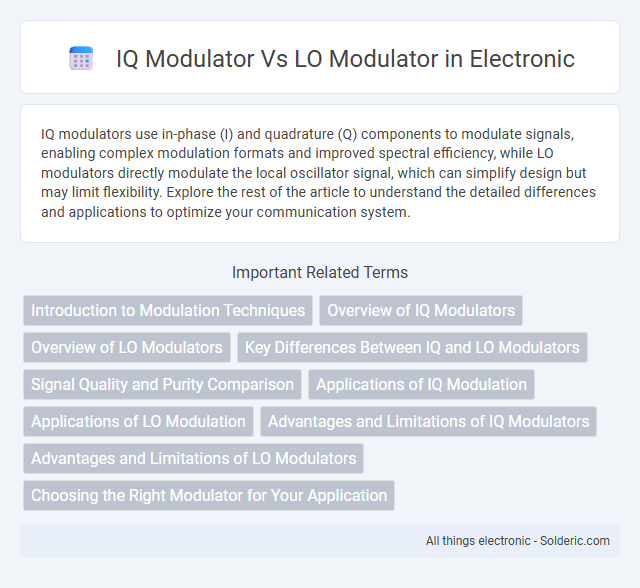IQ modulators use in-phase (I) and quadrature (Q) components to modulate signals, enabling complex modulation formats and improved spectral efficiency, while LO modulators directly modulate the local oscillator signal, which can simplify design but may limit flexibility. Explore the rest of the article to understand the detailed differences and applications to optimize your communication system.
Comparison Table
| Feature | IQ Modulator | LO Modulator |
|---|---|---|
| Function | Modulates in-phase (I) and quadrature (Q) signals separately for complex modulation schemes | Uses a Local Oscillator (LO) signal to modulate carrier frequency with input signal |
| Signal Type | Complex baseband (I/Q) signals | Single RF carrier signal and baseband input |
| Modulation Flexibility | Supports advanced modulation formats (QAM, PSK) | Typically used for simpler modulation (AM, FM) |
| Complexity | Higher circuit complexity due to separate I and Q paths | Lower complexity, simpler implementation |
| Performance | Better performance in spectral efficiency and signal quality | Limited performance for complex modulation |
| Applications | Digital communication systems, Software Defined Radios (SDRs), advanced wireless systems | Basic RF modulation, simple transmitter designs |
Introduction to Modulation Techniques
IQ modulators and LO modulators are essential components in advanced communication systems, each serving distinct roles in signal modulation. IQ modulators manipulate in-phase (I) and quadrature (Q) components to enable complex envelope modulation formats like QAM and PSK, enhancing spectral efficiency and signal integrity. LO modulators utilize a local oscillator signal to shift the frequency of the baseband signal, crucial for upconversion in transmitter chains, allowing your system to operate at desired carrier frequencies with high precision.
Overview of IQ Modulators
IQ modulators manipulate in-phase (I) and quadrature (Q) signals to generate complex modulation formats such as QPSK and QAM, enabling efficient bandwidth utilization in modern communication systems. They offer precise control over amplitude and phase, essential for high-speed digital transmissions and advanced wireless standards like 5G and LTE. Unlike LO modulators, IQ modulators separate the carrier modulation into orthogonal components, providing enhanced signal fidelity and spectral efficiency.
Overview of LO Modulators
LO modulators generate a local oscillator (LO) signal to mix with the baseband input, enabling frequency translation in RF communication systems. They play a crucial role in upconversion and downconversion processes, ensuring signal integrity and reducing phase noise. Your system's overall performance depends on the LO modulator's stability and linearity.
Key Differences Between IQ and LO Modulators
IQ modulators use in-phase (I) and quadrature (Q) components to independently control amplitude and phase, providing precise signal modulation for complex communication systems. LO modulators, on the other hand, rely on a single local oscillator signal to modulate the carrier frequency without separate I and Q paths, resulting in simpler but less flexible modulation. Your choice between IQ and LO modulators depends on the required signal fidelity and complexity of the modulation scheme.
Signal Quality and Purity Comparison
IQ modulators provide superior signal quality and purity by enabling precise control over amplitude and phase, which minimizes signal distortion and sideband interference. LO modulators often suffer from unwanted phase noise and spurious emissions due to direct mixing with the local oscillator signal, degrading overall signal clarity. Consequently, IQ modulators are preferred in high-performance communication systems where signal integrity and spectral purity are critical.
Applications of IQ Modulation
IQ modulation is widely used in modern communication systems such as 4G LTE, 5G NR, and Wi-Fi for efficient spectrum utilization and high data rate transmission. It enables complex modulation schemes like QAM and QPSK, improving signal robustness and spectral efficiency in wireless communications, satellite links, and radar systems. IQ modulators are essential in software-defined radios and advanced digital signal processing, facilitating precise phase and amplitude control for optimal signal performance.
Applications of LO Modulation
LO modulation is commonly used in radar systems, wireless communication transmitters, and frequency synthesis, providing precise control over carrier frequency and phase. It enables efficient upconversion of baseband signals to higher frequencies, crucial for microwave and millimeter-wave applications. The technique supports applications requiring stable and low phase noise signals, such as satellite communication and broadband wireless networks.
Advantages and Limitations of IQ Modulators
IQ modulators offer precise control over amplitude and phase, enabling complex signal modulation formats such as QAM and PSK, which enhances spectral efficiency and data capacity in communication systems. Their primary advantage lies in the separation of in-phase (I) and quadrature (Q) components, allowing for independent modulation and the generation of arbitrary constellations, essential for modern digital modulation schemes. Limitations include higher complexity, sensitivity to imbalances and imperfections in the I and Q paths that can degrade signal quality, and increased cost compared to simpler LO modulators.
Advantages and Limitations of LO Modulators
LO modulators offer advantages such as simplified design and improved phase noise performance due to direct modulation at the local oscillator frequency. However, their limitations include reduced flexibility in modulation schemes and potential challenges in achieving wideband frequency tuning compared to IQ modulators. Despite these constraints, LO modulators are preferred in applications requiring low phase noise and compact circuitry.
Choosing the Right Modulator for Your Application
Selecting the right modulator hinges on your application's complexity and signal requirements; IQ modulators provide enhanced control over amplitude and phase, making them ideal for advanced communication systems with high spectral efficiency. LO modulators, on the other hand, offer simpler implementation and are well-suited for applications where cost and design simplicity are priorities. Evaluating the trade-offs between performance factors and hardware constraints ensures your system achieves optimal modulation fidelity and operational efficiency.
IQ modulator vs LO modulator Infographic

 solderic.com
solderic.com